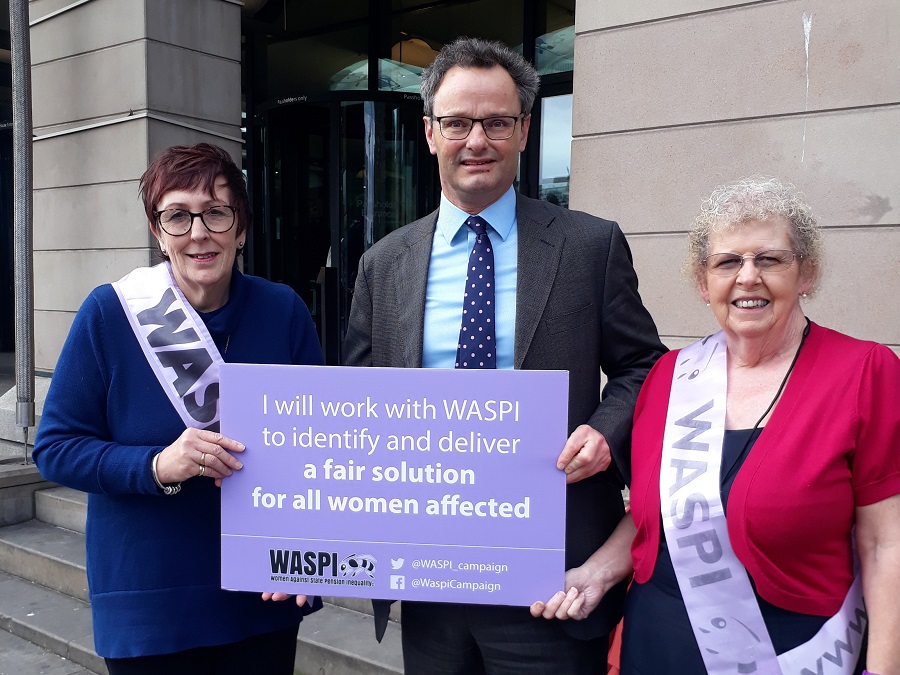Good morning,
I am writing to provide you with an update.
I have been contacted by a large number of constituents over a number of years who believe changes to their state pension, resulting in women born in the 1950s seeing their pensionable age rise from 60 to 66, were brought in unfairly by the Government. In the Waveney constituency alone, the House of Commons Library estimates that there are a total of 2,600 women, born in the 1950s who have been affected by changes to the state pension age by the 1995, 2007 and 2011 Pension Acts.
Whilst in principle, I am supportive of equalising the pensionable age between men and women, I continue to believe that a large volume of women were given inadequate notice of when these changes were coming in, giving them insufficient time to prepare and in many cases causing significant distress and financial hardship. Moreover when the equalisation process was accelerated in 2011, with hindsight the relief introduced were inadequate. I continue to believe that the impact of the changes to 1950s women were of a disproportionately negative nature.
I fully understand ongoing frustration on this issue and I am doing all that I can to ensure colleagues remain informed and in support of the cause for compensation.
The All-Party Parliamentary Group on State Pension Inequality for Women, of which I am a member, have outlined when that there could be up to one million women who are affected by these changes. In the past, Ministers have indicated that there would be transitional relief for these women, however the Government has yet to take action to redress the situation.
As you may be aware, in recent months, the campaign group Backto60 have sought legal redress through the courts.
On 5 - 6 June 2019, the High Court granted permission for judicial review of “matters arising from the government policy of equalisation of women‘s pension ages and the impact of those changes on women born in the 1950s.”
On 3 October 2019, the High Court gave judgment on the claim for judicial review brought by the Backto60 campaign. The claimants’ grounds were that the mechanisms chosen to implement the increases in the pension age discriminated on grounds of age and/or sex. They also sought judicial review of the government’s “alleged failure to inform them of the changes.” Unfortunately, the court dismissed the claim on all grounds.
The Backto60 Group has since sought leave to appeal and has launched a crowdfunding appeal, which you can view here: https://www.crowdfunder.co.uk/appeal.
Responding to the judgement, WASPI stated on the 3 October: “We will continue to campaign both to seek genuine cross-party support in Westminster, and to seek justice via the complaints of maladministration process.”
Moving forward, I confirm that addressing this injustice against 1950s women remains a personal priority and I have met with both the WASPI and Backto60 Group in Parliament in the last week to discuss their campaigns, and ways in which I can support them.
On 17th October I asked two questions to the Government in Women & Equalities Questions, which I have copied below. Given that the matter is again subject to ongoing legal proceedings, I was unfortunately not able to obtain any movement on the issue from the Government.
**Women and Equalities Questions: 17 October 2019**
Peter Aldous
What discussions she has had with the Secretary of State for Work and Pensions on the implications for the Government’s policies of the High Court judgment of 3 October 2019 on the increase in the state pension age for women born in the 1950s.
The Parliamentary Under-Secretary of State for Work and Pensions (Mims Davies)
The claimants applied for permission to appeal on 16 October 2019, which was of course yesterday. Hon. Members will therefore understand that I cannot comment on live litigation.
I am grateful to the Minister for those replies, but notwithstanding the High Court decision and the appeal, there are thousands of women in my constituency who were born in the 1950s and who are affected. They find the support and advice measures that have been put in place inadequate, and I ask the Minister to liaise with the Prime Minister and my right hon. Friend the Secretary of State for Work and Pensions to look again at this issue.
Mims Davies
I thank my hon. Friend for his comments. I absolutely understand that this is about a sense of balance. I reiterate my point that we have a wide range of benefits and support in the jobcentres—[Interruption.] Well, if the hon. Member for Brent Central (Dawn Butler) disagrees, I would be happy to meet her to say more. It is absolutely right that if the support is not there, people should come to the jobcentres, speak to me and get involved with the DWP. We will support these women. This is ultimately about equality. We now have no defined retirement age for anyone: anyone who can work can continue to do so, and for anyone who wants to have a secure retirement, we will support them.
However, I remain hopeful that given the ongoing parliamentary pressure from campaign groups, parliamentarians and constituents, this could still change in the future.
I have also signed:
- Early Day Motion #2296, which calls for providing financial restitution to 1950s Women. This is available to view here: https://edm.parliament.uk/early-day-motion/52822/providing-financial-restitution-to-1950s-women
- Early Day Motion #3, which calls on the Government to deliver pensions justice for WASPI women. This is available to view here: https://edm.parliament.uk/early-day-motion/53349/women-against-state-pension-inequality
I will continue to keep you updated on my work over the coming weeks and welcome any feedback or comments you may have.

